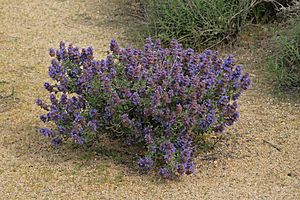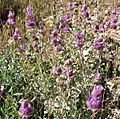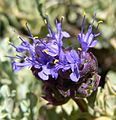Purple sage facts for kids
Quick facts for kids Purple sage |
|
|---|---|
 |
|
| Scientific classification |
|
| Kingdom: | Plantae |
| Clade: | Tracheophytes |
| Clade: | Angiosperms |
| Clade: | Eudicots |
| Clade: | Asterids |
| Order: | Lamiales |
| Family: | Lamiaceae |
| Genus: | Salvia |
| Species: |
S. dorrii
|
| Binomial name | |
| Salvia dorrii (Kellogg) Abrams
|
|
| Script error: The function "autoWithCaption" does not exist. | |
Script error: No such module "Check for conflicting parameters".
Salvia dorrii, also known as purple sage or Dorr's sage, is a beautiful plant. It is a type of perennial shrub, which means it lives for many years. This plant belongs to the mint family, called Lamiaceae. You can find Salvia dorrii growing naturally in the mountains of the western United States. It is common in places like the Great Basin and down to the Mojave Desert. It likes to grow in dry soil that drains water well.
What Does Salvia dorrii Look Like?
Salvia dorrii is a woody shrub that can grow from about 4 inches (10 cm) to 2.3 feet (70 cm) tall and wide. Its leaves are a pretty grey-green color. They are long and narrow, usually without any teeth or bumps on the edges. These leaves are typically found near the bottom of the plant and are about 0.4 to 1.2 inches (1 to 3 cm) long.
If you touch or crush the leaves, they release a strong, pleasant minty smell. It's quite unique!
The flowers of Salvia dorrii are bright purple and grow in spike-like clusters. Each cluster is about 0.5 to 1.2 inches (1.2 to 3 cm) wide. The flowers are symmetrical, meaning they look the same on both sides. They have small, round leaf-like parts called bracts, which are about 0.2 to 0.5 inches (0.5 to 1.2 cm) long.
The main part of the flower, called the corolla tube, is about 0.2 to 0.5 inches (0.6 to 1.3 cm) long. While usually blue, the flowers can also be purple, pink, or even white. After the flowers are pollinated, they stay on the plant for weeks or even months, even after they dry out.
How Salvia dorrii Helps Nature
This plant plays an important role in its environment. It is a special food source for the young (larvae) of the elegant sphinx moth. This means the moth caterpillars eat the leaves of Salvia dorrii as they grow.
-
Salvia dorii var. pilosa in Antelope Valley, about 2,945 feet high
-
Salvia dorii in Red Rock Canyon National Conservation Area
 | Emma Amos |
 | Edward Mitchell Bannister |
 | Larry D. Alexander |
 | Ernie Barnes |





